|
|
|
Sort Order |
|
|
|
Items / Page
|
|
|
|
|
|
|
| Srl | Item |
| 1 |
ID:
119961
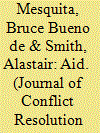

|
|
|
|
|
| Publication |
2013.
|
| Summary/Abstract |
Temporary membership on the United Nations Security Council (UNSC) has pernicious effects on the political and economic development of nations, particularly in nondemocracies. The leaders of rich democratic states often trade resources for the salient policy favors that UNSC members can deliver. This provides the leaders of temporary UNSC members with access to "easy money" resources. Such resources have deleterious consequences, particularly in nondemocracies, because they provide leaders with the means to pay off their coalition of supporters without reliance on tax revenues. While foreign aid is an important form of easy money bribe, it is but one of many. Empirical tests show loans are a substitute means for bribing UNSC members.
|
|
|
|
|
|
|
|
|
|
|
|
|
|
|
|
| 2 |
ID:
154253
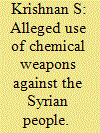

|
|
|
|
|
| Summary/Abstract |
The US has justified the use of military force against the Syrian regime under Bashar al-Assad, after its alleged use of chemical weapons against civilians. However, as long as the UN Security Council does not agree to intervention, unilateral American action is not permissible under the UN Charter. Even the principle of “responsibility to protect” is not justified in this case, as action would most likely be short, punitive and unlikely to end the attacks on Syrian civilians. The use of force rules, originating in customary international law and partially codified in the UN Charter, establish the lawful framework for the initiation of military activity by a government. Humanitarian intervention or a military campaign calculated to stop widespread attacks on a civilian population, including acts of genocide, other crimes against humanity and war crimes is also contested as it is not defined in the UN Charter, although many scholars and activists claim it is supported by the charter's central objective to defend human rights and fundamental freedoms.
|
|
|
|
|
|
|
|
|
|
|
|
|
|
|
|
| 3 |
ID:
101893
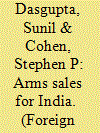

|
|
|
|
|
| Publication |
2011.
|
| Summary/Abstract |
With India planning to buy $100 billion worth of new weapons over the next ten years, arms sales may be the best way to revive Washington's relationship with New Delhi, its most important strategic partner in the region.
|
|
|
|
|
|
|
|
|
|
|
|
|
|
|
|
| 4 |
ID:
115189
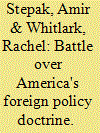

|
|
|
|
|
| Publication |
2012.
|
| Summary/Abstract |
One balmy Washington evening in June 2011, President Barack Obama was set to deliver a highly anticipated address declaring the drawdown of US forces in Afghanistan. What he delivered, however, was much more. In his speech, Obama laid out a clear foreign-policy doctrine, touching on the role the United States should play in world affairs, the values it holds dear, and the principles guiding its use of force and diplomatic efforts. Rejecting the divergent paths of isolationism and expansionism, Obama called for 'a more centered course':
|
|
|
|
|
|
|
|
|
|
|
|
|
|
|
|
| 5 |
ID:
099171
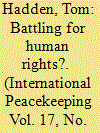

|
|
|
|
|
| Publication |
2010.
|
| Summary/Abstract |
The achievement of the objectives of international security, peacekeeping operations and peace enforcement, like the operations in Iraq and Afghanistan after the initial invasions, and of unilateral security operations, like those in Chechnya, Lebanon and Gaza, is often threatened by high levels of civilian casualties and physical destruction. Much of this is legitimized under the laws of armed conflict, notably the principles of legitimate military objectives and collateral damage, but would be contrary to human rights standards. This article argues that the claim that the laws of armed conflict and human rights are complementary is misleading and that international and national security, peacekeeping and peace-enforcement operations designed to protect and promote human rights should in principle be conducted under human rights standards. It explains how this could be achieved for international operations conducted under the auspices of United Nations Security Council Resolutions and/or status-of-forces agreements.
|
|
|
|
|
|
|
|
|
|
|
|
|
|
|
|
| 6 |
ID:
153546
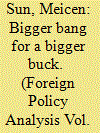

|
|
|
|
|
| Summary/Abstract |
While China used to condemn UN peacekeeping as a Western tool in the 1970s, it now supplies the largest number of UN peacekeeping troops among the UN Security Council Permanent Five. To explain this puzzling change in China’s attitude toward UN peacekeeping, this paper constructs an original framework that unpacks China’s evolution in self-identity as a “responsible major power” by first disaggregating the economic, military, and political costs and benefits for its participation in UN peacekeeping. In so doing, this paper shows that China’s attitudinal change is best captured by a shift from a present-cost-driven, “purchase” model of participation in international institutions to a future-benefit-driven, “investment” model of participation. A series of key events that occurred between the mid-1990s and the early 2000s, notably China’s accession to the WTO and its successful bid to host the 2008 Olympic Games, had in part accustomed China to paying large institutional costs upfront in order to be “part of the club.” The paper concludes with a brief discussion on the applicability, or the lack thereof, of the Chinese experience to other countries’ experiences with international institutions given China’s unique historical trajectory and cultural idiosyncrasies.
|
|
|
|
|
|
|
|
|
|
|
|
|
|
|
|
| 7 |
ID:
062408
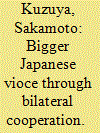

|
|
|
| 8 |
ID:
121419
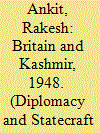

|
|
|
|
|
| Publication |
2013.
|
| Summary/Abstract |
The Jammu and Kashmir dispute of 1947-1949 between India and Pakistan became the first inter-state conflict to be discussed at the United Nations Security Council. This analysis looks at the views of the government and the delegation of Great Britain, one of the five permanent members of the Security Council, on Kashmir through the year of 1948. It argues that the British attitude was determined more by Imperial and Commonwealth strategic and ideological imperatives in South and Central Asia and the Middle East and less by the merits of the cases of the disputants. Operating within the twin backdrop of decolonisation and the Cold War, the British official mind juggled Kashmir's accession to India, India's complaint of aggression against Pakistan, and Pakistan's demand for a plebiscite in Kashmir with an eye to their own hopes and fears in a region that it understood as the key vantage on Communism and Islam.
|
|
|
|
|
|
|
|
|
|
|
|
|
|
|
|
| 9 |
ID:
187528
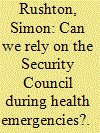

|
|
|
|
|
| Summary/Abstract |
In passing resolutions on HIV/AIDS, Ebola and COVID-19, the Security Council has shown at least a passing interest in health, and calls have been made to give it a more central role in global disease response. In this contribution, reflecting on two decades of the UNSC’s engagement with health emergencies, I suggest we should be cautious about making the Security Council too central to pandemic response. I focus on three problems with the Council: that it is highly politicised and deeply divided in ways that mean it cannot be relied on to act when needed most; that when it does act it tends to do so too late, once an emerging problem has already become a global crisis; and that it does not in any case necessarily have the tools at its disposal to make a meaningful contribution. Instead, I argue, it is precisely its role as a ‘health outsider’ that enables the UNSC to occasionally make a contribution. It would be risky indeed to hand such a body real responsibility for crisis response. That is a task much more likely to be performed assiduously (if often imperfectly) by a body such as the WHO.
|
|
|
|
|
|
|
|
|
|
|
|
|
|
|
|
| 10 |
ID:
138320
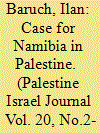

|
|
|
|
|
| Summary/Abstract |
In March 2006 I was received by President Hifikepunye Pohamba of Namibia, as the ambassador designate of Israel to that country, in his official residence in the capital city Windhoek. The tall and elegant man with a captivating beaming smile warmly received my letter of accreditation. According to protocol we sat for a short conversation. This was the opportunity for him to set the rules for our future relations.
|
|
|
|
|
|
|
|
|
|
|
|
|
|
|
|
| 11 |
ID:
056392
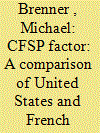

|
|
|
| 12 |
ID:
157567
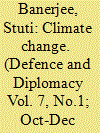

|
|
|
| 13 |
ID:
080899
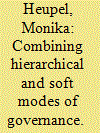

|
|
|
|
|
| Publication |
2008.
|
| Summary/Abstract |
In the wake of 9/11, the UN Security Council (SC) set out to urge every UN member to strengthen its domestic capacity to counter transnational terrorism and the heightened risk of weapons of mass destruction (WMD) proliferation to non-state actors. This article examines the modes of governance the SC applied - in terms of both setting and implementing rules - to influence states' activities in response to these two security threats. The far-reaching, generic, legally binding obligations imposed on every UN member were unprecedented and indicate a `hierarchical' approach. Yet, the SC - partly deliberately, and partly out of necessity - drew extensively upon a range of `soft' governance modes to support implementation and enhance the legitimacy of its approach. It remains to be seen whether this approach will be the precursor to a future trend. However, its usefulness will depend on whether the SC members will come to an agreement on how to implement `legislative' resolutions, and whether non-Council members will be granted greater influence in SC decision-making. Although more empirical research is needed on the SC's application of different modes of governance, these results contribute to a better understanding of the use of governance modes by international organizations other than the European Union
|
|
|
|
|
|
|
|
|
|
|
|
|
|
|
|
| 14 |
ID:
178552
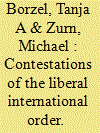

|
|
|
|
|
| Summary/Abstract |
The 1990s saw a systemic shift from the liberal post–World War II international order of liberal multilateralism (LIO I) to a post–Cold War international order of postnational liberalism (LIO II). LIO II has not been only rule-based but has openly pursued a liberal social purpose with a significant amount of authority beyond the nation-state. While postnational liberal institutions helped increase overall well-being globally, they were criticized for using double standards and institutionalizing state inequality. We argue that these institutional features of the postnational LIO II led to legitimation problems, which explain both the current wave of contestations and the strategies chosen by different contestants. We develop our argument first by mapping the growing liberal intrusiveness of international institutions. Second, we demonstrate the increased level and variety of contestations in international security and international refugee law. We show that increased liberal intrusiveness has led to a variety of contestation strategies, the choice of which is affected by the preference of a contestant regarding postnational liberalism and its power within the contested institution.
|
|
|
|
|
|
|
|
|
|
|
|
|
|
|
|
| 15 |
ID:
140415
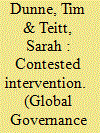

|
|
|
|
|
| Summary/Abstract |
This article examines institutional patterns of leadership and followership in the UN Security Council with respect to the Responsibility to Protect principle. In a departure from existing literature on leadership and followership in international relations, which has hitherto been framed within a realist analysis, the article presents a constructivist account of leadership that sheds light on the strategies and scope of conditions for mobilizing international action to protect populations from mass atrocities. The article applies a theoretical innovation to case studies that examine strategies that India and China adopted in the Security Council to respond to the crises in Libya and Syria from 2011 to 2013. This integration of theory and empirics reveals a complex and layered account of factors that shape the Security Council's ability to exercise its Responsibility to Protect. In doing so, the article demonstrates that followership and leadership are relational practices that create or limit the possibilities for institutional action.
|
|
|
|
|
|
|
|
|
|
|
|
|
|
|
|
| 16 |
ID:
062002
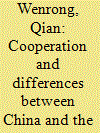

|
|
|
| 17 |
ID:
160986
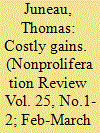

|
|
|
|
|
| Summary/Abstract |
Iran’s nuclear ambitions have been at the center of Middle Eastern politics and a global nonproliferation source of concern for almost twenty years. Much has been written on the topic, but one important question has received less attention: was it beneficial for the Islamic Republic? How have the gains and losses associated with its nuclear pursuits compared with each other? This article attempts to provide a comprehensive assessment of the costs and benefits of Iran’s nuclear program. We start with an overview of the literature on why states pursue nuclear programs. This allows us to build a list of objectives that states can hope to achieve through their nuclear ambitions. We use these as yardsticks to assess the gains Iran has reaped and the losses it has incurred. This leads to the conclusion that, although Iran has earned some benefits from its nuclear program, these have been costly; ultimately, the costs have exceeded the benefits. We conclude by reflecting on what the Iranian case tells us more broadly about the study of nuclear proliferation.
|
|
|
|
|
|
|
|
|
|
|
|
|
|
|
|
| 18 |
ID:
178319
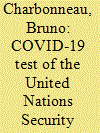

|
|
|
|
|
| Summary/Abstract |
The United Nations Security Council (UNSC) has failed the COVID-19 test, unable to promote or facilitate multilateral cooperation in dealing with the outbreak. This is worrying given its relevance as a principal organ of the United Nations (UN) that could enable or constrain international cooperation and given the need for such cooperation in responding to the COVID-19 pandemic. The failure of the UNSC to respond adequately to the COVID-19 pandemic highlights the historical limits of the UNSC as a forum for international cooperation. It also suggests that highlighting and debating UNSC reforms are not sufficient or even productive ways to move forward, especially in the context of the challenges that pandemics and climate change represent for global cooperation. It is far from clear if the UN system can change the global structures on which it was built. What does seem clear is that the UNSC is not where one will find the seeds of change for reimagining global order.
|
|
|
|
|
|
|
|
|
|
|
|
|
|
|
|
| 19 |
ID:
142006
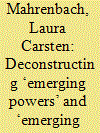

|
|
|
|
|
| Summary/Abstract |
Academic literature and the media offer a variety of monikers for emerging states like Brazil, India and China, most prominently, ‘emerging powers’ and ‘emerging markets’. This article argues the terms used to describe these states create assumptions about their behaviour in global governance (GG). In order to accurately assess the impact of emerging states on international institutions, it is necessary to more systematically examine their current participation in GG. Does the use of power and economic interests in GG negotiations distinguish emerging states from traditional powers, as the ‘emerging’ part of these terms suggests? And can the content of GG negotiations predict the dominance of each factor, as implied by the ‘power/market’ part? This article tackles these questions by comparing the behaviour of one emerging state (India) and one traditional power (the United States) in negotiations at the World Trade Organisation and the United Nations Security Council. The results demonstrate that, while there is clearly something distinctive about at least India’s participation in GG, focussing on power or economic interests alone is insufficient to explain that distinctiveness or its implications for relations between rising and traditional powers in GG.
|
|
|
|
|
|
|
|
|
|
|
|
|
|
|
|
| 20 |
ID:
059151
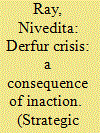

|
|
|
|
|
| Publication |
Oct-Dec 2004.
|
|
|
|
|
|
|
|
|
|
|
|
|
|
|
|
|
|
|
|
|